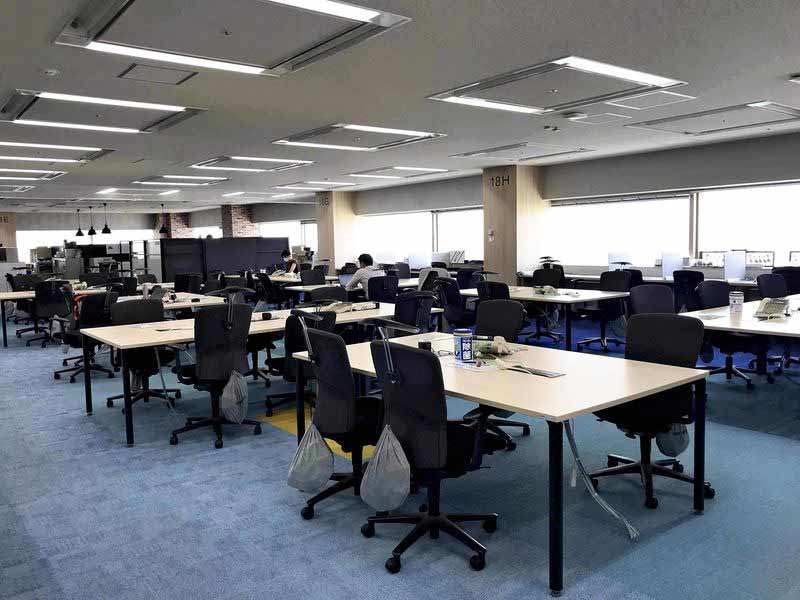
With many employees teleworking, most seats are empty at an office used by the Asahi Group Holdings, Ltd. in Sumida Ward, Tokyo, in August.
November 22, 2021
More than half of Japanese companies said they would maintain their current teleworking policies even with the end of the pandemic state of emergency, according to a survey conducted by The Yomiuri Shimbun.
However, nearly 30% of respondents indicated they would reduce teleworking, which has become common amid the pandemic, with firms asking employees to spend more time at the office.
The survey was conducted from late October to early November, after a state of emergency imposed due to the coronavirus pandemic ended nationwide and as business hours at restaurants and bars largely returned to normal. A total of 125 major companies responded.
When asked about teleworking policies, 70 companies, or 56%, said they would “maintain the status quo.” Thirty-five indicated “reduce,” followed by “expand” at five, while two replied “undecided or under consideration.”
“Basically, we’ll continue teleworking,” a Fujitsu Ltd. official said. “But [employees] can come to the office if there’s a need to work face-to-face.”
The government’s basic coronavirus policy, which was revised Friday, still calls for companies to promote teleworking, but the goal of having 70% of staff telecommute was removed.
More firms may reduce teleworking as many company officials believe better communication with business partners and coworkers is facilitated by employees being in the office.
Asked about policies for employees having meetings over meals with colleagues and business partners, 73 respondents said they would “ease” their rules, while 44 indicated they would “maintain the status quo.” Four replied “undecided or under consideration.” None plan to introduce stricter rules.
To prevent the spread of infections, many companies have refrained from holding in-person meetings, not only among their employees but also with business partners.
In late October, the Tokyo metropolitan government and the Osaka prefectural government lifted requests for restaurants and bars to shorten business hours for the first time in 11 months.
Based on rules set by local governments, many companies have changed their policies and now allow employees to hold in-person meetings under certain conditions, such as in small groups and for a short time.
“We have lifted the ban [on meetings] on condition that the necessity is assessed and thorough infection mitigation measures are taken,” said a Honda Motor Co. official.
Top Articles in Business
-

Prudential Life Insurance Plans to Fully Compensate for Damages Caused by Fraudulent Actions Without Waiting for Third-Party Committee Review
-

Narita Airport, Startup in Japan Demonstrate Machine to Compress Clothes for Tourists to Prevent People from Abandoning Suitcases
-

Japan, U.S. Name 3 Inaugural Investment Projects; Reached Agreement After Considerable Difficulty
-

Toyota Motor Group Firm to Sell Clean Energy Greenhouses for Strawberries
-

SoftBank Launches AI Service for Call Centers That Converts Harsh Customer Voices into Softer Voices
JN ACCESS RANKING
-

Japan PM Takaichi’s Cabinet Resigns en Masse
-

Japan Institute to Use Domestic Commercial Optical Lattice Clock to Set Japan Standard Time
-

Israeli Ambassador to Japan Speaks about Japan’s Role in the Reconstruction of Gaza
-

Man Infected with Measles Reportedly Dined at Restaurant in Tokyo Station
-

Videos Plagiarized, Reposted with False Subtitles Claiming ‘Ryukyu Belongs to China’; Anti-China False Information Also Posted in Japan




















